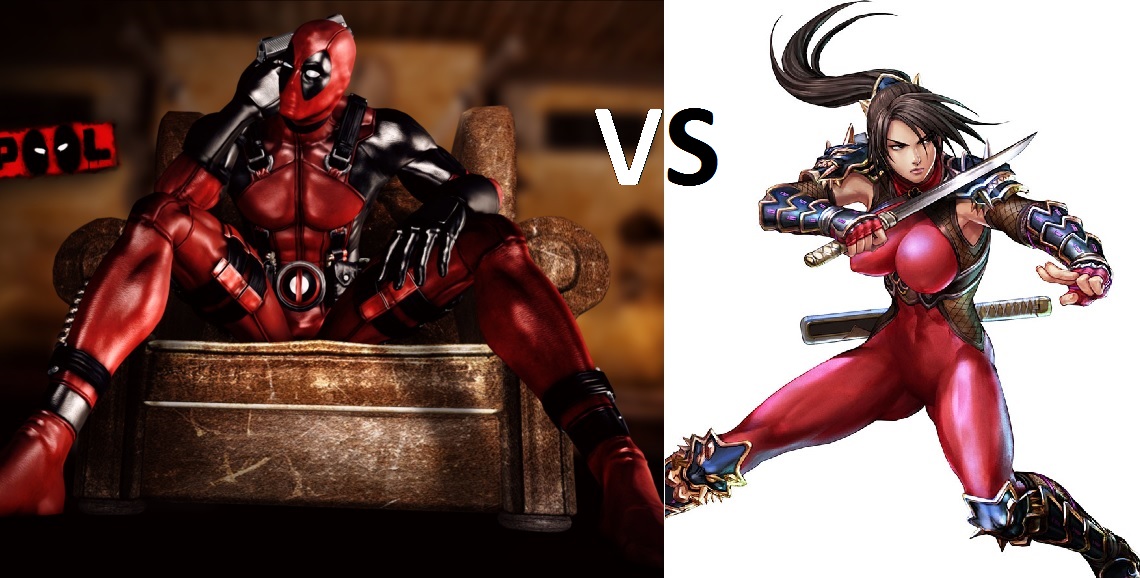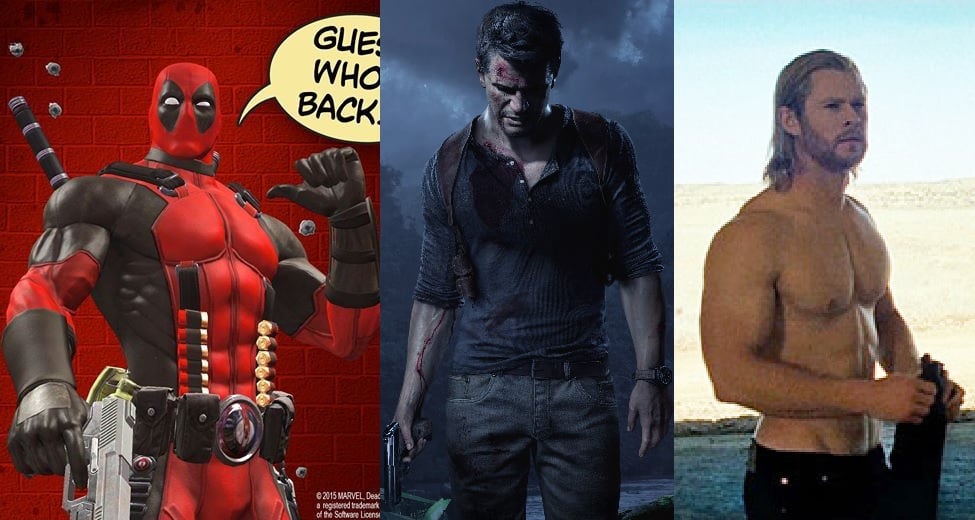Be it the latest rage over Tracer’s pose for Overwatch, Alison Rapp’s sexually charged dismissal from Nintendo, or the craze surrounding Microsoft’s hiring of female models at one of their events, there has certainly been a great deal of talk regarding the perception of female sexuality in the video game industry. Something that tends to grab far less attention, however, is the perception of the male sex in video games and perhaps in the entertainment industry in general.
From Deadpool’s rock hard abs, Thor’s crazy arms and Drake’s physique despite his age, male protagonists tend to be extremely athletic.
images taken from game covers and the movie preview for Thor
Athleticism and fitness are fundamental characteristics of Superheroes
The argument could be made that these physical attributes are a by-product of the characteristics and personality traits that the protagonists possess. For instance, a soldier in Call of Duty has to be athletic. A super-mercenary/mutant is obviously as fit as can be. A world renowned treasure hunter can’t help but be buff.
The sort of Alpha males that are often portrayed in video games tend to be more masculine in general, which goes hand in hand with their macho personalities. While the portrayal of female personalities is certainly over-exaggerated, when it comes to the men, it is more a by-product of the type of heroes we’ve come to expect, which in turn forces developers to make them more masculine.
Obviously, no one would want to play a morbidly obese superhero, but limiting the over-exaggerations could certainly be a start. What if Thor had a six-pack instead of an eight-pack? Or the Hulk, being a giant green monster, didn’t have extremely in-shape abs? What if Spiderman skipped chest day every now and again?
Meeting the quota
The issue remains that while there is certainly a great deal of commotion when it comes to the misrepresentation of the female body in video games, there’s certainly a lack there-of for the men. In reality, the fact that attractive, athletic and sexualized characters – whether male or female – are more appealing in video games and certainly boost sales is largely the reason developers and designers make use of them.
This profit-based mentality is by and large also the reason for a greater number of male protagonists in video games. The great majority of the gaming audience are men, and this is especially true for violent and action-packed titles. A game is obviously more appealing (to men) when you can fully empathize with your avatar, something that cannot be done to the same degree with a female protagonist. Interestingly enough, this is is also the likely reason for the presence of sexually-charged and flirtatious female supporting characters. After all, as we all know, sex sells!
Customization’s place in the problem
Of course, games that allow physical customization tend to be an exception to this trend. Fallout 4, for instance, allows a physical build choice ranging between muscular, skinny and overweight in a triangular manner. However, the great majority of gamers, when given the choice, go for a more muscular physique, as can be seen in the plethora of in-game screenshots available online. While the argument could clearly be made that people tend to be more attracted to a muscular physique, and are naturally more likely to pick a more attractive physique for their own character, this feature is by no means representative of the general population.

The Proteus Effect
But is this necessarily a bad thing? I mean sure, we have unrealistic expectations of both female and male physicality, but so what? In fact, due to a phenomenon known as the Proteus effect, there may even be benefits to this trend. The Proteus effect takes place when a person reflects the characteristics of their avatar, upon themselves. This effect is amplified even further when you assimilate the character to reflect your own looks and attributes, but aren’t limited to using only your real-world physical traits. In other words, seeing yourself as a strong, dominant and attractive male could boost your confidence and even motivate you to transform yourself to better match your avatar.
This doesn’t always end up as a positive factor however; at times, the sheer ease with which a player can ‘become’ athletic and muscular (virtually) becomes a deterrent in their physical lifestyles. This in turn feeds into the unhealthy lifestyles that gamers are somewhat known for.
Concluding remarks
So what’s the point to all this? Should all men just start working out six days a week to meet these perceptions that have been set forth? Or perhaps we should boycott all video games that over-exaggerate the human physique? Or maybe we need to send a clear message to developers that we aren’t buying games based on their sexual attractiveness? That decision is entirely yours to make. However, realizing that this problem isn’t unique to women, is still important.
So what do you think? Is it fair to compare men and women in an industry that is largely male dominated, in both the consumer and supplier side of things? Is it fair to only focus on women’s issues, where the men aren’t exactly represented correctly either? Should critics also talk about men’s over-sexualization in video games? Let us know what you think in the comments section below.








Published: Apr 20, 2016 02:13 am